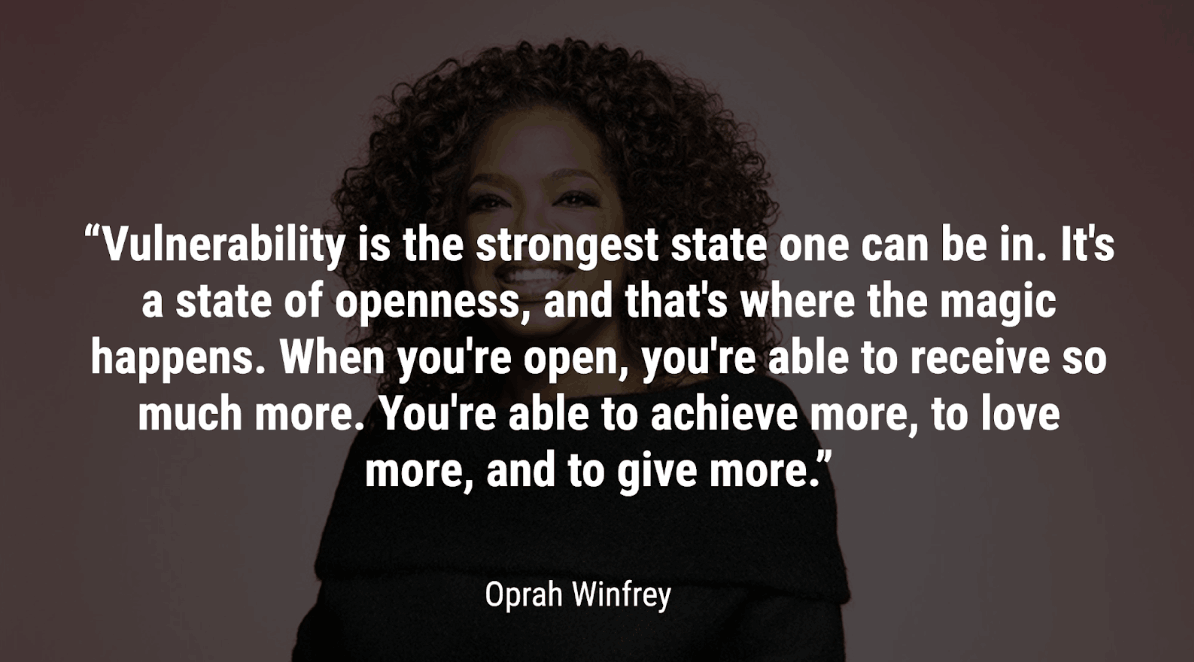I do not doubt that vulnerability is the secret ingredient to creating truly inclusive, equitable and diverse workplaces. Vulnerability provides an essential foundation for openness and trust and the platform for people to be open about their own challenges. It encourages open communication, promotes psychological safety, builds a stronger foundation for problem-solving and collaboration, and encourages learning and growth.
Leaders who show vulnerability are also often seen as more authentic and approachable. This can improve the effectiveness of their leadership as employees feel more comfortable discussing concerns and providing feedback. Ultimately, vulnerable leaders are more likely to inspire loyalty and commitment from their team.
Despite this, data has repeatedly shown that vulnerability is not rewarded or valued in the workplace. In fact, our latest Masculinity in the Workplace research revealed that, while 56% of people consider vulnerability a key leadership skill, only 35% felt it was valued in the workplace. A massive 41% even believed it was dangerous to show vulnerability in the workplace.
While there does appear to be a shift with most clients I work with, many senior leaders continue to struggle to be vulnerable at work. How this presents itself often differs between genders. We often hear from women that they find it easy to be vulnerable with friends but struggle to be vulnerable in the workplace due to fear of being judged. In fact, 44% of junior/middle female employees believe it’s dangerous to show vulnerability in the workplace (Masculinity in the Workplace Place Research 2020). On the other hand, men can often struggle to be completely vulnerable with their friends. One senior leader recently said to me, “You’re asking me to be vulnerable in work when I’m not even comfortable being vulnerable with my own wife.”
It’s understandable that people are fearful when they hear the word vulnerable. What words does the word conjure up for you? Have a think now and write them down.
It’s also helpful to think about the definition of vulnerability. It refers to “the quality or state of being exposed to the possibility of being attacked or harmed, either physically or emotionally.”
It’s therefore unsurprising that the word ‘vulnerability’ makes so many people feel uncomfortable. It would also be unsurprising if one of the words you wrote down came from this list: fear, anxiety, nervousness, exposed, fragile, risk. Ultimately, vulnerability can be downright scary.
At this point, let’s do a thought experiment:
- Think about the last time you did something courageous. Maybe write it down and take a few minutes to remember it properly.
- Now, think back to how you were feeling just before it happened. What words spring to mind?
From my experience of this exercise, words that commonly arise are fear, anxiety, nervousness, exposed, fragile and risk. It’s no coincidence that this is very similar to those we hear for vulnerability. That’s because they are interlinked; vulnerability is ultimately the source of courage.
One other word that often comes up when I ask people what word vulnerability invokes is weakness. As someone who has has stood on stage in front of hundreds of people to talk about losing my brother to cancer, I can safely say that vulnerability is not weakness. It is still one of the hardest things I ever do in my work, and yet, I still do it because I witness first-hand the positive impact it has on others. I’ve had so many people over the last five years thank me for showing my vulnerability as it inspired them to open up themselves.

Vulnerable leadership is quite simply the secret ingredient for inclusive leadership, but the journey to get there can be a difficult one. Often, it needs to be within the context of an organisation that is moving towards an inclusive culture in which vulnerability is recognised and rewarded. This is why much of my work is done at a senior leadership level with teams working together to create a culture of vulnerability. In the absence of this, you might find you are being judged and may need to confine your vulnerability to the teams you have control over.
Saying that, here are my top tips for becoming a more vulnerable leader:
- Be inspired by the queen of vulnerability: It’s almost impossible to talk about vulnerability in the workplace without mentioning Brené Brown as she has done so much work to show the impact of vulnerability. A good starting point would be to watch her TED talk on the Power of Vulnerability. One senior leader thanked me recently after I shared it with him, saying “This talk has changed my life.”
- Start with self-awareness: Understand your emotions, strengths, and weaknesses. Recognise when you’re feeling vulnerable and be honest with yourself about it. If you find you have become disconnected from your emotions, try using the Feelings Wheel to find the word which best describes what you are feeling. I use this in most of my work with men and have seen how powerful it can be just to name a feeling and discuss it, if only for 5 minutes.
- Choose the right people to test with: Identify trustworthy individuals in your workplace who are supportive and understanding. By sharing your vulnerability with them first and seeing the positive impact doing so has, you’ll find it less daunting to open up more widely.
- Start small: Start with small acts of vulnerability before diving into deeper emotions or personal experiences. This could be small challenges that you are experiencing at home or just talking about concerns over an existing project. It will be far easier to start small.Once you start to feel more comfortable, you can gradually open up further.
- Be authentic: The Deloitte Leadership centre for inclusion found that 61% of people cover their true identities in the workplace – not necessarily hiding something, but downplaying it for fear of drawing unwanted attention or making others uncomfortable. Your path to vulnerability may simply entail embracing your genuine self and avoiding wearing a mask to hide your fears. Authenticity is key to building genuine connections.
- Own your mistakes: Nobody is perfect, and it’s okay to acknowledge your mistakes or shortcomings. Sharing these experiences can help humanise you in the eyes of your colleagues. Also, don’t be afraid to tell your team that you don’t have all the answers and to admit you’re relying on their support to achieve a target.
- Be an active listener: Encourage others to share their vulnerabilities by being an attentive and non-judgmental listener. Lead by example by creating a supportive atmosphere and be sure to reward people who show vulnerability to you.
- Seek support when needed: I know from personal experience that this journey can be difficult and there will be times when you struggle. When this happens, don’t hesitate to seek support from colleagues, mentors, or even professional resources such as counselling or coaching.
- Set boundaries: While it’s essential to be open, also be mindful of your emotional well-being. Set boundaries around what you’re comfortable sharing and with whom. I would also avoid over-sharing. While being vulnerable is beneficial, sharing too much personal information may be inappropriate for the workplace. It’s important that you use your judgement to strike the right balance. Recognising it’s not about divulging everything can make it far easier for people to embrace vulnerability.
- Recognise that there will be setbacks and learn from them: If you encounter negative reactions or breaches of trust, don’t let it deter you entirely. Treat it as an opportunity to learn and grow, and remember that not everyone may be receptive to vulnerability.
Vulnerability is a process, and it’s okay to take small steps and go at your own pace. By embracing vulnerability, you can develop deeper and more meaningful connections with your colleagues and foster a more inclusive, equitable and diverse workplaces.
As Brene Brown once said, “To be a leader is to be vulnerable every minute of the day. You don’t get to opt out. If you don’t understand vulnerability, you cannot manage and lead people.”
Daniele Fiandaca is co-founder of Token Man Consulting
You can sign up to Token Man’s panel on the Power of Vulnerability in 2024 here.


